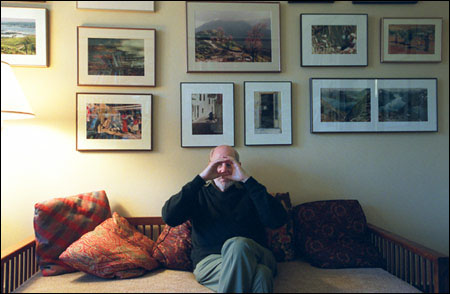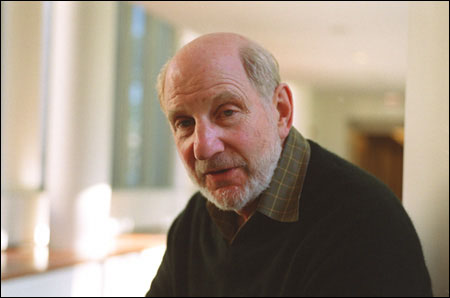HRP continues to fight the tough battles
Human Rights Program turns 20; parallels changes in international movement

This weekend (Oct. 15 – 17), Harvard Law School’s Human Rights Program (HRP) will mark its 20th anniversary with a gathering principally of alumni and a full slate of speeches and discussions. And in many ways, the celebration also honors the movement it embraces. The emergence of the international human rights movement, which dates back to the 1945 Nuremberg Trials and the 1948 Universal Declaration of Human Rights, has much in common with the growth of Harvard’s program over the past two decades.
“It’s a very new movement,” says Henry Steiner, founder and director of the HRP. “Its current shape and content didn’t exist even in the progressive imagination when the movement got under way. Its basic treaties and institutions weren’t in place as recently as three decades ago.” During President Jimmy Carter’s administration, the wars in Central America and mounting arguments of U.S. involvement nudged human rights to prominence in American discourse. By the early 1980s, student activism had caught hold so much that when Steiner founded the HRP in 1984, with just a handful of teachers and courses throughout the University focused on international human rights, the student demand for human rights studies outstripped supply.
No more, says Steiner, who is the Jeremiah Smith Jr. Professor of Law, describing the program’s robust 20 years. It’s grown from just two courses in 1984 to 10 this year, and its budget leapt 10-fold. Visiting fellows – scholars and activists from around the world – now number about 10 per year and student engagement in clinical work, through summer internships as well as term-time pro bono work, is booming.
Now, the interfaculty University Committee on Human Rights Studies embraces not only the HRP but also the Francois-Xavier Bagnoud Center for Health and Human Rights at the School of Public Health, the Carr Center for Human Rights Policy at the Kennedy School of Government, and faculty members from all corners of Harvard working on human rights issues.
“Human rights has become so expansive a conception that it permeates other fields, from cultural anthropology, economic development, political theory, or ethnic conflict to health care, terrorism, and conflict resolution,” says Steiner.

Academics and action
While the unhappy but inevitable persistence of human rights violations makes the HRP’s work consistently relevant, the program also owes its vitality to the synergies of student leadership and faculty initiative and of academics and action.
As the program has grown, so has student engagement, joining faculty-driven initiatives to create what Steiner calls “a productive dialectic of top-down and bottom-up influences.” He points with pride to the Harvard Human Rights Journal, founded by students in 1988; the burgeoning student organization of conferences supported by HRP; and the recent formation of Harvard Law School Advocates for Human Rights, a student organization that works closely with HRP to advance clinical work.
“This student group furthered a basic goal of this program, which is not only to spur research and scholarship through course work, seminars, papers, conferences, and so on, but also to involve the student community in more active ways, because many students want to be engaged in those ways,” he says.
Most students blend clinical and scholarly work, jumping from one side of the discipline to another with relative ease. Steiner calls this dual focus a hallmark of the program. “HRP said from the start that it wanted to bring together reflection and action; engagement and scholarly discourse; advocacy and internal criticism of the movement. And we have,” he says. “Each of these activities importantly nourishes and enriches the other.”
An unwinnable war worth fighting
Despite the deserved celebration of its progress, the continued strength and rising popularity of the Human Rights Program over the past 20 years has a tragic undertone.
The Human Rights Program’s 20th anniversary celebration this weekend (Oct. 15-17) will feature many of its prominent alumni now working as activists or academics. Principal speakers are Amnesty International Secretary General Irene Khan (LL.M. 1979) and International Criminal Court Judge Navi Pillay (S.J.D. 1988). For more information on the weekend’s public programs, visit http://www.law.harvard.edu/programs/hrp/20th.htm.
“Of course there will never be a final triumph that secures the basic human rights ideals for all generations, and we all know that,” says Steiner. “The gross violations stem from profound and dangerous aspects of our human nature captured in famous maxims such as, ‘Power tends to corrupt, and absolute power corrupts absolutely.’”
Yet it’s not only the continued abuse of human rights that motivates Steiner, his colleagues, and HRP students, it’s the movement’s ongoing successes. A new discourse has been institutionalized in international relations that has stirred resistance to oppressive regimes, he notes, and nongovernmental organizations and media spread the world about violations. “Once you know something, it’s harder to blink,” says Steiner.
Passion, not pessimism, characterizes Steiner’s discussion of human rights and the program. Whatever the odds, he says, the battle against human rights abuses is infinitely worth fighting, and the academic study and criticism of the movement remains indispensable.
“We don’t know how much worse the world would be without the movement,” he says, adding that the fight enlarges our conception of humanity. “It expands our vision of what it means to be human.”




